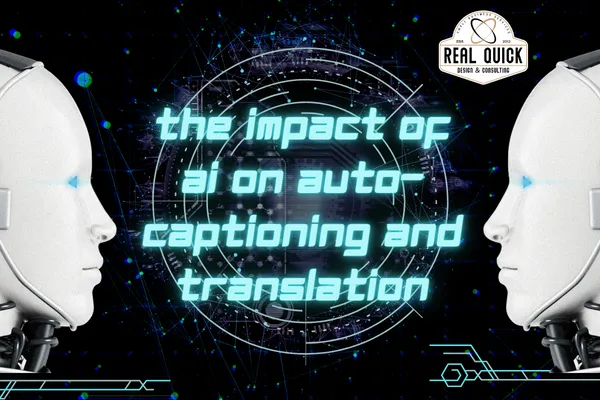Our Articles
Helpful Articles For Better Business Results
Clear tips guide your business toward steady success

Transforming Social Media Accessibility: The Impact of AI on Auto-Captioning and Translation
In recent years, the intersection of artificial intelligence (AI) and social media has ushered in a new era of accessibility and inclusivity. One area where this synergy is particularly evident is in the realm of auto-captioning and translation. Through the remarkable advancements in AI technology, social media platforms have been able to provide a more enriching experience for users regardless of language barriers or disabilities.
Auto-captioning, once a feature primarily reserved for professional content creators, has become increasingly accessible and accurate thanks to AI-driven algorithms. These algorithms analyze the audio track of videos, transcribing spoken words into text with impressive precision. This functionality not only benefits individuals with hearing impairments but also enhances the viewing experience for all users. Whether watching a video in a noisy environment or simply preferring to watch content with the sound muted, auto-captioning ensures that the message is conveyed effectively.
Moreover, the integration of AI-powered translation services has further expanded the reach of social media content. Platforms like YouTube now offer real-time translation of automatic captions, enabling viewers to consume videos in their preferred language seamlessly. This capability not only breaks down language barriers but also fosters global connectivity and cultural exchange. A video creator in Japan can now reach audiences in Brazil, France, or India, transcending linguistic boundaries and expanding their influence.
The implications of these advancements extend beyond mere convenience; they represent a paradigm shift in how we communicate and consume content online. By harnessing the power of AI, social media platforms are democratizing access to information and fostering greater inclusivity. However, as with any technological innovation, there are both opportunities and challenges to consider.
One of the key opportunities presented by AI-driven auto-captioning and translation is the ability to tap into new markets and demographics. Brands and content creators can reach a broader audience base, potentially increasing engagement and monetization opportunities. Moreover, the enhanced accessibility of social media content can lead to greater social impact, empowering marginalized communities and promoting diversity and inclusion.
On the flip side, the widespread adoption of AI-powered features also raises ethical considerations and technical challenges. While auto-captioning and translation algorithms have improved significantly, they are not infallible. Errors in transcription or translation can lead to misinterpretation or misrepresentation of content, potentially causing harm or offense. Ensuring the accuracy and reliability of AI-generated captions and translations requires ongoing refinement and quality assurance measures.
Furthermore, the use of AI in social media introduces concerns about data privacy and algorithmic bias. As platforms collect vast amounts of user data to train their AI models, questions arise about the ethical use and safeguarding of this data. Additionally, there is a risk of algorithmic bias, where the AI system inadvertently perpetuates stereotypes or discriminates against certain groups based on factors like race, gender, or language.
To address these challenges and maximize the benefits of AI-driven auto-captioning and translation, a multi-faceted approach is required. First and foremost, platform developers must prioritize user privacy and data security, implementing robust measures to protect user information. Transparent communication about data usage policies and opt-in/opt-out mechanisms can help build trust with users and mitigate concerns about privacy.
Secondly, continuous monitoring and evaluation of AI algorithms are essential to identify and mitigate bias and inaccuracies. This involves diverse and inclusive training data sets, algorithmic audits, and mechanisms for user feedback and correction. By incorporating feedback loops into the AI development process, platforms can iteratively improve the accuracy and fairness of auto-captioning and translation services.
Finally, collaboration between technology companies, regulatory bodies, and civil society organizations is crucial to establish clear guidelines and standards for AI ethics and governance. By fostering an open dialogue and sharing best practices, stakeholders can collectively address the complex ethical, social, and technical challenges posed by AI in social media.
In conclusion, the integration of AI-driven auto-captioning and translation services represents a significant advancement in social media accessibility and inclusivity. These technologies have the potential to break down language barriers, empower marginalized communities, and facilitate global communication and understanding. However, realizing this potential requires a concerted effort to address ethical concerns, ensure algorithmic fairness, and safeguard user privacy. By navigating these challenges thoughtfully, we can harness the transformative power of AI to create a more accessible, inclusive, and equitable social media landscape for all.
Ready to revolutionize your social media accessibility? Don't wait! Contact us now at 805-977-5899 📞 to explore how AI-powered auto-captioning and translation can enhance your content's reach and impact. Break down language barriers, empower diverse audiences, and create a more inclusive digital space. Our team is standing by to help you implement these transformative features and elevate your online presence. Let's make your content accessible to all, effortlessly. Reach out today and take the first step towards a more inclusive social media experience!
Ready to learn more?
Start reading today.
Real Quick Design & Consulting shares clear, helpful posts that guide your business with easy steps, useful ideas, and steady direction. Each article supports your progress and makes daily decisions easier.
© Copyright 2026 Real Quick Design & Consulting. All Rights Reserved.
